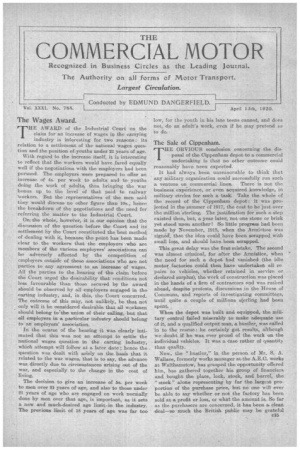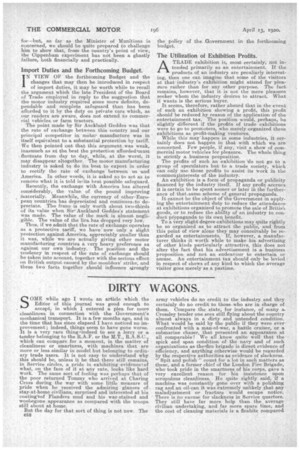The Wages Award.
Page 1

Page 2

If you've noticed an error in this article please click here to report it so we can fix it.
. THE AWARD of the Industrial Court on the claim for an increase Of wages in the carrying industry is interestingfor two reasons: its relation to a settlement of the national wages question and the position of youths under 21 years of age. With regard to the increaae itself, it is interesting to reflect that the workers would have fared equally well if the negotiations with the employers had been pursued. The employers were prepared to offer an increase of 4. per week to adults and to youths doing the work of adults thus bringing the war bonus up to the level of that paid to railway ‘vorkers. But the representatives of the men said they would discuss no ether figure than 10s., hence the breakdown of the 4egotiations and the need for referring the matter to the Industrial Court.
On the whole, however, it is our opinion that the discussion of the question before the Court and it settlement by the court constituted the best method of dealing with it, because the paint has been made clear to the workers that the employers who are members: of the various employers' associations can be adversely affected by the competition of employers outside of these associations who are not parties to any agreement to an increase of wages. All the parties to the hearing of the claim before the Court urged the desirability that conditions not less favourable than those secured by the award should be observed by all employers engaged in the carting industry, and, in this, tho Court concurred.
• The outcome of this may, not unlikely, be that not only will it be considered desirable that all workmen should belong to'the union of their calling, but that all employers in a particular industry should belong to an employers' association.
In the course of the hearing it was clearly intimated that this was not an attempt to settle the national wages question in the carting industry, which attempt will follow at a later date ; hence the question was dealt with solely on the basis that it related to the war wages, that is to say, the advance. was directly due to circumstances arising out of the war, and especially, to the change in the cost of living. .
The decision to give art increase of 5s, per week to men over 21 years of age, and also to those under • 21 years of age who are engaged on work norrnally done by men over that age, is important, as it sets a new and much-desired age limit in the industry. The previous limit of 18 years of age was far too low, for the youth in his late teens cannot, and does not, do an adult's work, even if he may pretend so to do.
The Sale. of Cippenham.
HE OBVIOUS conclusion concerning the dis posal of the Cippenham depot to a commercial undertaking is that no other outcome could reasonably have been expected.
It had always been unreasonable to think that any military Organization could successfully run such a venture on commercial lines. There is not the business expe-rience, or, even acquired knowledge, in military circles for such a task. Take the whole of the record of the Cippenham depot: it was projected in the summer of 1917, the cost to be just over the million sterling. The justification for such a step existed then, but, a year later, not one stone or 'brick yet stood urea another go. little progress had been 'made by November, 1918, when the Arrnit-liee was signexT, that the idea could have been swapped with small loss, and should have, been scrapped.
This great delay was the first mistake. 'The second was almost criminal, for .after the Armistice, when the need for such a depot had vanished (the idle motor factories could then have undertakee all re pairs to vehicles, whether retained in service or declared surplus), the work of construction was placed in the hands of a firm of contractors and was ruOled ahead, despite protests, discussions in the House of commons, and reports of investigating committees, until quite a couple of millions sterling. had been When the depot was built and. equipped, the military control failed miserably ta make adequate use of it, and a qualified output man, a hustler, was called in to the rescue: he certainly got results, although we .doubt if he was ever proud of the work on the individual vehicles. It was a Case rather of quantity than quality.
Now, the " lnistler," in the person of Mr. S. A. Wallace, formerly works .manager at the A.E.O. works at Walthamstow, has grasped the opportunity offered him, has gathered together his group of financiers anti bought the place, lock, stock, arid barrel, the " stoek " alone representing' by far the, largest proportion of the purchase price, but no one will ever be able to say whether or not the factory has been sold at a profit or loss, or what the amount is. So far as the. purchasers are concerned. it has been a clean deal—so much the British public may be grateful
for—but, so far as the Minister of Munitions is concerned, we should he quite prepared to challenge him to show that, from‘ the country's point of view, the Oipperiliam experiment has not been a ghastly failure, both financially and practically.
Import Duties and the Forthcoming Budget.
IN -yaw OF the forthcoming Budget and the changes that may then be introduced in respect of import duties, it may he worth while to recall the argument which the late President of the Board of Trade employed in reply to the suggestion that the motor industry required some more definite, dependable and complete safeguard than has been afforded to it by the duty on private ears which, as our readers are aware, does not extend to commer
eial vehicles or farm tractors. .
The point made by Sir Auckland Geddes was that the rate of exchange between this country and our principal competitor in. motoe manufacture was in itself equivalent to a substantial protection by tariff. We then pointed out that this argument was weak, inasmuch as at the best the protection affordeelqrsust fluctuate from day to day, while, at the worst, it may disappear altogether. The motor manufacturing industry is asked tq do its best to export in order to rectify the rate of exchange between us and America. In other words, it is asked so to act as to remove what it is told is4its best possible safeguard.
Recently, the exchange with America has altered considerably, the value of the pound improving Materially. Meanwhile, the currency of other-European 'countries has depreciated and eentinueseto depreciate. The franc is only worth about two-thirds of its value when Sirs AucklandGeddes's statement was made. The value of the mark is almost negli.gible. The value of the lira has dropped very low.
Thus, if we admit that the rate of exchange operates as a protective tariff, we havenow only a slight protection against America, appreciably smaller than it was, while we are actually giving other motor manufacturing countries is very heavy preference as against our own industry. The • position and the tendency in respect of the rate of exchange should be taken into account, together with the serious effect on British output caused by the moulders' strike, and these two facts together should influence strongly
the policy of the. Government in the forthcoming budget.
The Utilization of Exhibition Profits.
ATRADE exhibition is, most certainly, not intended primarily as an entertainment. If the products of an industry are peculiarly interesting, then one can imagine that some of the visitors at thateindustry.s exhibition might attend for pleasure rathee than for any other purpose. The fact remains, however, that it is not the mere pleasure seeker whom the industry desires to attract. What it wants is the serious buyer.
It. seems, therefore, rather absurd that in the event of such an exhibition showing a profit, this profit should be reduced by reason of the application of the entertainment tax. The position would, perhaps, be slightly different if the profits of trade exhibitions were to go to promoters, who merely organized these exhibitions as profit-making -ventures.
While this may happen in some industries, it certainly does not happen in that with which we are concerned. Few people, if any, visit a show of commercial motor vehicles for pleasure. The whole thing is strictly a business proposition. The profits of such an exhibition do not go to a group of speculators but to a trade society, which can only use those profits to assist its work in the common5interests of the industry.
An exhibition is a form of propaganda or publicity financed by the industry itself. If any profit accrues it is certain to be spent sooner or later in the furtherance of ,thatssame scheme of general propaganda.
It cannot be the object of th.e Government in applying the .entertainment duty to reduce the attendance at exhibitions organized to promote the sale of British goods, or to reduce the ability of an industry to conduct propaganda to its own benefit. To a very slight degree exhibitions may quite rightly he so organized as to attract the public, and from this point of view alone they may conceivably be regarded as entertainments. If, however, a manufacturer thinks it worth while to make his advertising of other kinds particularly attractive, this does not alter the fact that his advertisement is a business proposition and not an endeavour to entertain or amuse. An entertainment tax should only be levied in respect of shows of any kind to which the average visitor goes merely as a pastime.


























